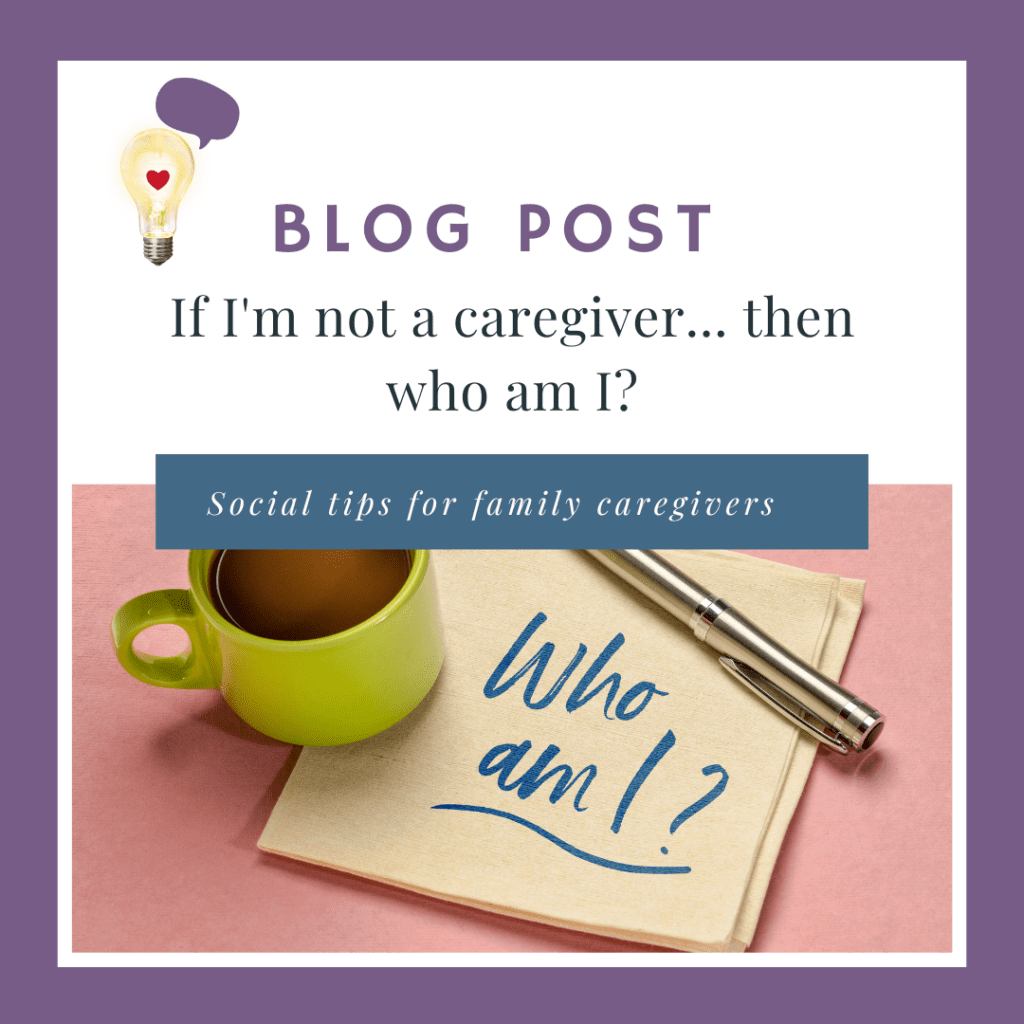If I’m not a caregiver… then who am I?

As people, we define our identities by what we do. For so many in the caregiving world, being a caregiver becomes an all-encompassing, all-consuming role. So, when the caregiving journey ends, either suddenly or expectedly, many caregivers are left with the question, “Who am I now?”
When your life is based around meeting the needs of another person or people, It’s hard to know what to do with yourself when those needs no longer need to be met. Questions like, “What do I do now?” “What would I like to do now?” and “what do I even like?” abound in the post caregiving haze.
As an occupational therapist, my most important job is to help people live the lives they want to live. One of the most important steps in meeting that ambitious and overarching goal is to first help people identify what they want that life to be filled with. Below are 3 common steps I frequently recommend people take when trying to reimagine their lives and set clear personal goals.
Step 1: Identify 3 to 5 things that truly bring you joy.
These can be small and simple. Sharing a meal, being outside, cooking, learning… There’s no right or wrong answers, only the answers that are right for you. Don’t forget that life is a dynamic process, and you are always changing along with it. The things that bring you joy may change overtime, and that’s OK. Revisit your list periodically and adjust as needed.
Step 2: Pick 1 or two things on your list that bring you joy and find a way to experience those things with others.
There are few things as important to our mental, emotional, and sometimes even physical health than being connected with other people. Over time, many caregivers experience their social world shrinking. When the caregiving journey comes to an end, and the most intense and important relationship of the caregiver has transitioned away from being a physical presence, intense loneliness and isolation can set in. At the same time, you might feel afraid of rejoining other parts of the world.
Attending a new group, taking a class, or even calling up an old friend or colleague can be intimidating. Be brave. You’ve already faced much greater challenges and come out on the other side. Pick an activity that feels doable, take a deep breath acknowledging both your discomfort and your strength, and show up.

Step 3: Be accountable to yourself, for yourself.
To do this I strongly suggest writing a weekly goal. Again, this can be simple.
“I will go for a walk outside three times this week.”
“I will invite my neighbor for lunch.”
“I will attend a cooking class.”
“I will speak at my support group.”
“I will tell a friend how I am feeling.”
“I will rejoin my Saturday night bowling league.”
“I will show up to the neighborhood book club that I’m always invited to.”
There are no right or wrong goals. Just make sure that the goal you write is achievable and is an actionable step moving you towards the things that bring you joy.
I find that most of the best goals I have for myself make me feel both excited and a little nervous or uncomfortable.
If you are a caregiver who is searching for life after caregiving, I hope that these steps are helpful in the next stage of your journey. As you discover who you are, and who you will become, remember that the part of you who is a caregiver has not been cut away with your loss. It is simply time to allow other parts of yourself to come to the forefront and thrive. Not in spite of your caregiving journey, but rather stronger for having been on it.
Emilia Bourland, OTR, ECHM is an occupational therapist, the owner of Higher Standards Caregiver Training, and a co-founder of Whole Care Network University (an expert led and vetted resource site for family caregivers). She specializes in quality education and practical training to help keep caregivers and their loved one’s safe.
Want to join Emilia for a live talk? Sign up for updates on upcoming events, courses, and discussion’s HERE.
Disclaimer: Consuming this content is not a substitute for health or medical advice, and does not constitute a therapeutic relationship. People should seek medical advice from a licensed health care provider if they feel they have a medical condition, impairment, disability, safety risk, or other needs related to health, wellness, and prevention. Neither the Author, nor any connected company or affiliation is providing medical advice or treatment of any kind in this document. No guarantees of specific results are promised or implied. Author/connected companies/affiliates are not liable for any injury or harm resulting from persons implementing tips, strategies, or information shared here.
Learn more about social issues of care by clicking the icon below.

